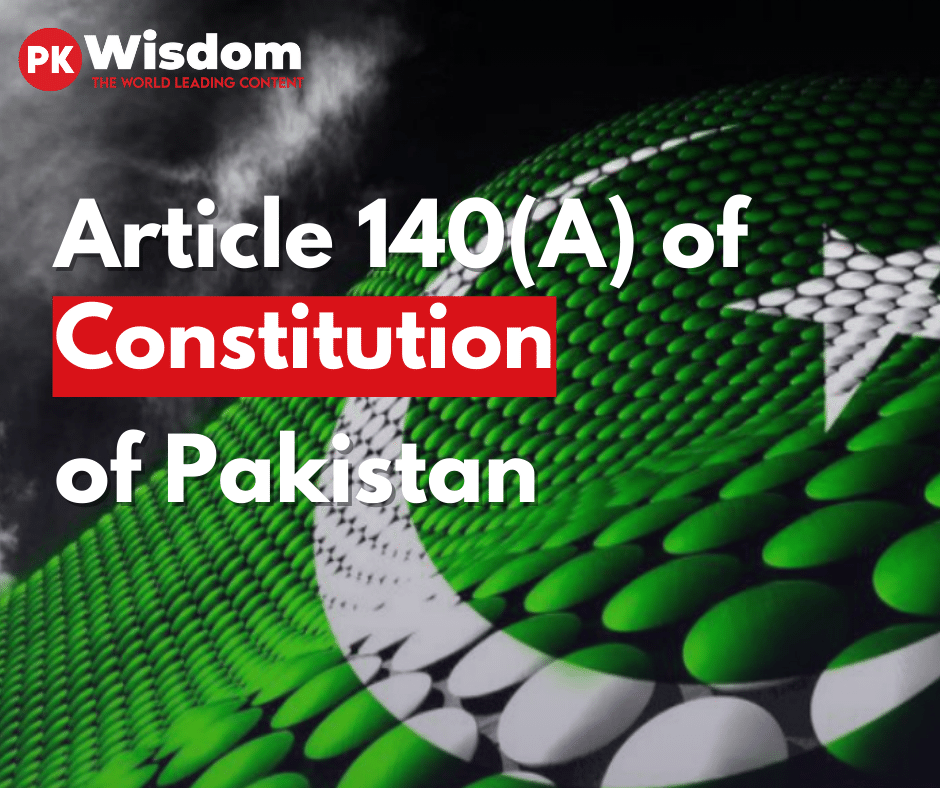Table of Contents
Overview of Article 140(A) of the Constitution of Pakistan
Enshrined in the 1973 Constitution of Pakistan, Article 140(A) stands as a beacon for localized governance. This constitutional provision signifies a commitment to community empowerment by mandating the establishment of a local government system in each province. In this blog post, we delve into the essence of Article 140(A), unpacking its directives to devolve political, administrative, and financial responsibilities to elected representatives at the grassroots level.
Article 140(A) States
140. Local Government:
- Each Province shall, by law, establish a local government system and devolve political, administrative and financial responsibility and authority to the elected representatives of the local governments.
- Elections to the local governments shall be held by the Election Commission of Pakistan.
Key Points of Article 140(A) of the Constitution of Pakistan
- Local Government Establishment: The cornerstone of Article 140(A) is the requirement for each province to establish a local government system through legislation. This marks a paradigm shift towards decentralized governance, acknowledging the unique needs and dynamics of communities at the grassroots level.
- Devolution of Authority: The crux of Article 140(A) lies in its mandate to devolve political, administrative, and financial responsibilities to the elected representatives of local governments. This intentional decentralization aims to empower communities by granting them a greater say in matters that directly impact their lives.
- Role of Election Commission: The article recognizes the importance of fair and transparent local government elections. By assigning the responsibility of conducting these elections to the Election Commission of Pakistan, Article 140(A) ensures an unbiased and impartial electoral process, reinforcing the democratic principles at the heart of Pakistan’s governance.
Download the Constitution of Pakistan in PDF
Crux of Article 140(A) of the Constitution of Pakistan
At its core, Article 140(A) is an ambitious constitutional provision that acknowledges the critical nature of local governance for any complex nation. By mandating local government systems and their establishment, Article 140(A) asserts the belief that local decision making best serves communities if decisions are taken by those who understand their needs and aspirations intimately.
The devolution of political, administrative, and financial responsibilities is a pivotal aspect of Article 140(A). This deliberate transfer of authority seeks to break away from centralized governance models, allowing elected representatives at the grassroots level to be the architects of policies and initiatives that directly impact their constituents. It fosters a sense of ownership and accountability among local leaders, promoting more responsive and tailored governance.
The involvement of the Election Commission of Pakistan in local government elections adds an extra layer of credibility to the democratic process. By entrusting the oversight of elections to an independent body, Article 140(A) reinforces the commitment to free and fair electoral practices, ensuring that the voice of the people is genuinely reflected in the choice of their local representatives.
Conclusion: Article 140(A) of the Constitution of Pakistan
In conclusion, Article 140(A) of the 1973 Constitution of Pakistan emerges as a catalyst for community empowerment and democratic governance. Its far-reaching implications extend beyond legal clauses to touch the lives of ordinary citizens by placing decision-making authority in the hands of local representatives.
As we navigate the constitutional landscape of Pakistan, Article 140(A) stands as a testament to the nation’s commitment to participatory democracy. It acknowledges the diverse needs of communities and affirms that sustainable development and effective governance are best achieved when decision-making power is decentralized.


